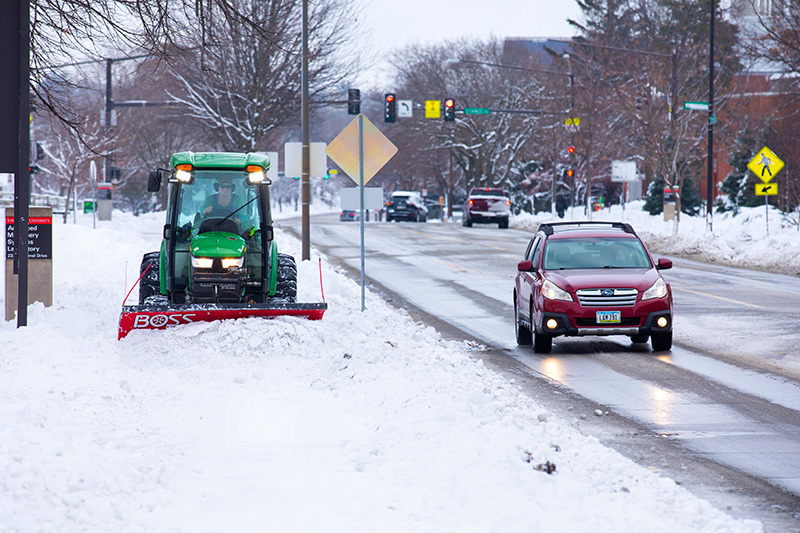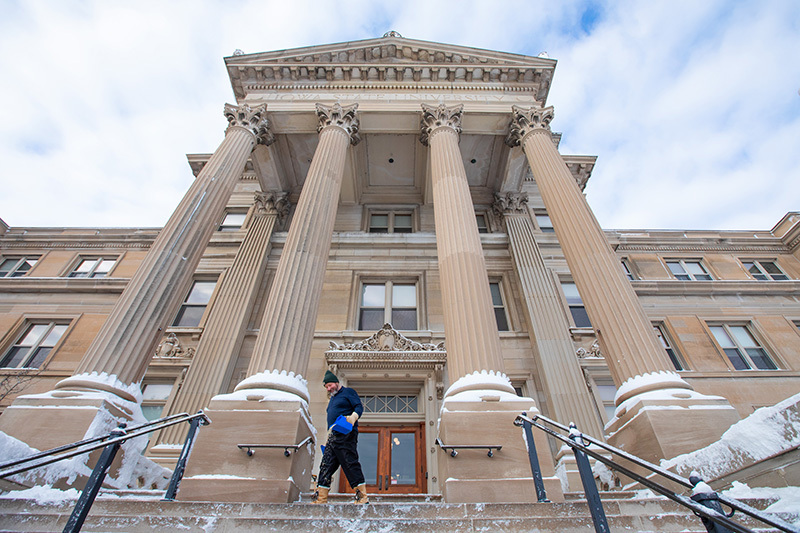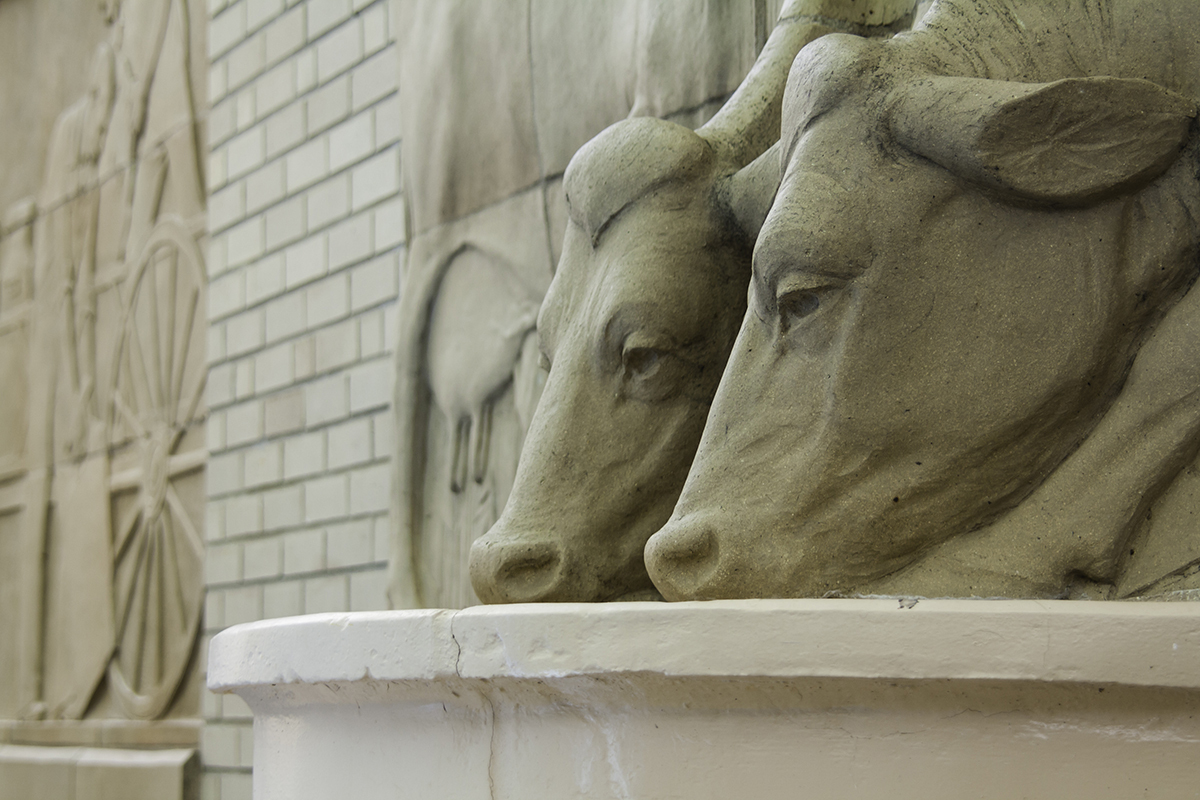First snow

Campus services' Mary Schrunk clears heavy snow in a tractor with a snow plow on a walkway along Pammel Drive on Wednesday morning. Photos by Christopher Gannon.
The first significant snowfall on campus this winter brought 8.8 inches of snow and wind gusts as high as 40 mph Monday night into Tuesday. Campus services teams spent much of Tuesday and Wednesday removing the wet and heavy white stuff from sidewalks and parking lots.
The team at Iowa State Weather on X, formerly known as Twitter, reported the eight-plus inches of snow is the third largest amount to fall on campus since 2015. More than 12 inches fell Jan. 14-15, 2022, and 11 inches was recorded on Feb. 1, 2015.
The Cedar Rapids area reported more than 14 inches of snow from the same storm that blanketed much of the state.
Iowa State Weather anticipates another round of snow and blowing Thursday night into Friday, with an additional three to six inches of snow, followed by plummeting temperatures that grip the state for several days. Spring semester begins Tuesday.

Campus services' Bob Adolph spreads rock salt on the steps of Beardshear Hall on Wednesday morning. Much of the day's work focused on clearing snow and ice while making surfaces slip resistant.
Funding available for first-generation and low-income undergraduates
The Center for Student Educational Success, a funded initiative this year of the university's strategic plan, has launched these funding opportunities for first-generation or low-income undergraduate students. Faculty and staff are encouraged to share these opportunities with their students. More information about these opportunities is online.
Book scholarships
The First Scholars Book Scholarship program offers up to $300 per semester for required course materials to students who have demonstrated financial need through the Office of Student Financial Aid. In its first round, a cohort of students will receive awards for up to three semesters (spring '24, fall '24, spring '25 or until graduation). The number of scholarships is based on applications and funding available. The final deadline for a spring 2024 grant is Monday, Jan. 29.
The scholarship application is available via the university's OneApp scholarship application (the general application must be completed first). In OneApp, select "All opportunities" and search for "First Scholars book scholarship."
Group tutoring funding
Funding for group tutoring is available during the fall and spring semesters for low-income or first-generation students. The service features weekly tutoring sessions, up to 14 sessions/semester. Tutoring financial support is available on a first-come, first-served basis. To get a tutor, visit Tutoring Services and select "First Scholars" as the funding source. Tutoring sign-up for spring semester opens Jan. 15.
International students can access tutoring support through the International Students and Scholars Office.
Senior completion grants
This completion grant offers financial support to students who are at risk of not completing their degree due to financial difficulties. The amount will vary depending on individual circumstances but generally will cover expenses such as tuition, books, housing, transportation and emergency expenses. It may be renewable for subsequent semesters contingent on continued eligibility and reapplication. For consideration for spring 2024 semester, the application will remain open until May 10.
To be eligible for the grant, students must:
- Demonstrate financial need, as determined by answers provided on the OneApp application and confirmed by ISU's office of student financial aid.
- Be eligible for a Pell Grant.
- Maintain a minimum 2.0 cumulative GPA.
- Be a graduating senior in fall or spring of the current academic year.
- Priority consideration but not required: Be enrolled as a first-generation college student (neither parent or legal guardian has completed a bachelor's degree at a 4-year institution)
Students eligible for senior completion grants also will need to complete the OneApp scholarship application. An instructions PDF is available from the Cyclone Success Assistance page.
Winter weather is here. Have a team plan
With more snow and bitterly cold temperatures in the forecast, university leaders want to remind employees to put safety first when traveling to campus.
If university leaders decide to cancel classes or close, this information will be shared through a campus message and on the university homepage and social media accounts. Campus units are encouraged to prepare and coordinate among themselves in advance for occasions when the university remains open, but weather conditions may make it difficult for employees to travel to campus. This may include opportunities to work remotely or make up work later in the work week.
"The needs of every unit are different, which is why we want supervisors to have the flexibility to develop a plan that works best for their team, while still fulfilling their responsibilities," said Kristi Darr, vice president for human resources.
In November, the departments of public safety and environmental health and safety sent an annual winter weather message to employees with information about campus closures and guidance for navigating campus during winter weather. University policy on weather-related emergency closings also provides guidance and outlines expectations for employees related to cancellations and closings.
Parking reminders
Facilities planning and management (FPM) teams work to clear parking lots and sidewalks as quickly as possible, but they ask for your help. FPM follows these priorities for clearing snow and ice:
- Roadways serving university facilities
- Parking lots: Accessible spaces, then permit spaces and general spaces
- Main walkways traversing campus and leading to main building entrances
- Main building entrances and accessible entrances
- Secondary sidewalks (those not in the primary route to campus facilities but instead leading to side or back doors)
- Secondary building entrances, including side and back entrances and limited-access exits
Employees are asked to park in alternative lots if their parking spot has yet to be cleared of snow when they arrive on campus:
- Iowa State Center commuter lots C and D (avoid CYTown construction)
- North of Molecular Biology (lots 29 and 30)
- North of General Services Building (lot 41)
Bigger health symposium returns for second year
The Health and Wellness Symposium returns for its second year with more offerings for faculty, staff and students. Co-chairs Ashley Pick and Melanie Reed worked to bring together experts and passionate presenters for a wide range of breakout sessions for the Feb. 2 (8:15 a.m.-3:30 p.m., Memorial Union) event.
Attending?
Those interested in attending the symposium can register online. Same-day registration also will be available.
"The focus this year is 'welcoming, belonging and well-being,' which highlights the importance of encouraging students, faculty and staff to incorporate self-care practices into their personal and professional lives. We want to create a deep connection to welcoming and supportive spaces to practice that self-care," said Reed, student wellness, mental health promotion and suicide prevention strategy specialist.
Associate director of the student health center Pick, who helped organize last year's event, was encouraged by the strong turnout of 350 participants a year ago and hopes for 500 this time. She said the free event already has had more people register than at the same point a year ago.
"A big focus is on peoples' well-being and how to support yourself and others," Pick said.
Breakout sessions
Attendees will choose from more than 20 breakout sessions spread over three 45-minute presentation periods. Topics range from the wellbeing options available on campus to embedding wellbeing in learning. Each session is led by a faculty or staff member, a student, or an expert from outside of ISU.
"Last year, we had a waitlist of people who wanted to take part, so we wanted to provide more availability," said Pick of the increased number of breakout topics. "These sessions are designed to give participants more information to help them do some skill building."
Reed said it was easy to identify experts across campus who showed a willingness to present impactful information. For sessions participants are unable to attend, materials -- including slide decks -- will be available to download. Some sessions are available to employees and students by appointment outside of the symposium.
Welcome
The day will begin with registration and a student poster session followed by video welcome from President Wendy Wintersteen and an in-person greeting from senior vice president for student affairs Toyia Younger.
One of the few changes from last year's schedule was to move up the keynote speaker from the end of the event to during lunch. Shawnte' Elbert is a public health and well-being administrator and a pioneer in college health and wellness. She champions equitable health care access and strives for safer college campuses. Elbert is currently the chief health equity officer for Columbus Public Health in Columbus, Ohio.
"I attended a conference in January 2023 and heard her speak and she is amazing," Reed said. "She has an extensive background in health and wellness, and has spent 18 years dedicated to student well-being and success. She is a powerful and impactful speaker."
A campus member and campus department will be honored for their work of going above and beyond to support health and well-being.
Fun and community
The symposium will conclude with all participants invited to CyBowl and Billiards to take part in fun, games and food. It also provides time for people to talk about things learned or actions to implement to help themselves or others.
A reminder: Guidelines for faculty and staff on political activity
With the 2024 legislative session underway this week and the Iowa caucuses just days away, it's an appropriate time to re-post this August story about political advocacy guidelines for university employees. Sharing this information also is among the 10 recommendations for diversity, equity and inclusion programming and policy at Iowa's three public universities approved in November by the state Board of Regents.
Iowa has a unique role in our nation's presidential election process through the Iowa caucuses. However, state Board of Regents and Iowa Code require Iowa State University to not participate in any activity that could be construed as favoring any party or candidate. Federal law requires that all candidates have equal and fair access to the university. Inviting a candidate or advocate to a class for example, requires that opposing candidates and speakers receive the same opportunities.
As a state institution, the university is politically neutral and is prohibited from endorsing any candidate for political office and using state property to campaign for candidates or ballot initiatives. Advocacy on behalf of the institution must be approved through the regents.
Additionally, the university cannot host campaign events on university property except through existing options -- such as rented facilities, student organization functions or the university lectures campaign series -- that are available equally to all members of the campus community. Federal law also prohibits campaign fundraising on university grounds.
Guidance for faculty and staff
As noted on the president's website and provost's website, Iowa State faculty and staff may participate fully in political activities if they are acting on their own behalf and using their own personal time and personal resources. This includes not using university resources for political activities -- including your computer or Iowa State email account -- and making it clear that you are only speaking for yourself, and your opinions do not represent those of the university.
Political activities that use public resources are generally prohibited. These include:
- Engaging in political activity during work time.
- Sending out a campaign mailing using Iowa State stationery or postage purchased by the university.
- Using a university provided telephone, computer, email account, or social media account to support of oppose a candidate or ballot initiative.
- Using an official university email list or listserv to send political material.
- Using university equipment to print or copy political material.
- Holding a campaign or political fundraising event in a university office space or other facility.
- Placing campaign signs on property owned by the university, including on or within university buildings.
Employees who speak on political issues should take care to note they are speaking as individual citizens, and their views are not the views of the university. This includes letters to the editor and opinion articles written by faculty and staff.
An additional area of concern is the use of classroom time for political discussions or activity. Faculty and instructors should take care to ensure political discussions are germane and appropriate to the curriculum of a course and avoid activities that may be perceived as partisan in nature without providing similar opportunities for members of the campus community with other viewpoints.
Faculty and staff with questions about legislative or matters may contact Iowa State's federal and state relations team. Questions regarding employee political activity may be directed to the office of university counsel.
Christian Petersen museum opens 2024 with two exhibitions about the artist

Detail from Christian Petersen's History of Dairying mural, completed in 1934 and installed in the Food Sciences Building courtyard. Image courtesy of university museums.
Two exhibitions about Iowa State's first artist-in-residence, Christian Petersen, will open with free admission on Tuesday, Jan. 16, at the Christian Petersen Art Museum in Morrill Hall. Both are guest curated by Ames native and alumnus Jerome Thompson (anthropology, '74), who retired in 2015 as state curator for the State Historical Society of Iowa.
Each focuses on a different aspect of Petersen's career. From 1934 to 1955, during his residency, Petersen completed 12 major campus public works of art that represent the history and culture of the Midwest and became the core of the Art on Campus collection.
In the Campbell gallery
Christian Petersen: A Sense of Place in Campus Life highlights many of the site-specific sculptures Petersen created for Iowa State's campus. Sketches, models and concept drawings will be on view to figuratively bring the sculptures to the Campbell Gallery, 1017 Morrill. Campus maps with marked locations of these sculptures will be provided for visitors to explore the sculptures at their campus locations. The exhibition runs through July 26.
"In 2007, I wrote about my experiences with encountering Petersen's works of art around campus as a 'faculty kid' growing up in the 1950s and 1960s," Thompson said. "The array of his sculpture around campus gives a special sense of place to me that I have not found on any other campuses I have visited. I suspect others who have experienced the Iowa State campus as a student, alumni, or community resident may have a similar view."
In the Reiman Gallery
The Fountain of the Four Seasons currently is undergoing conservation and replication. It consists of a fountain, pool, terra cotta ring around the fountainhead and four limestone sculptures known as the maidens. The project addresses issues of wear from the 80-plus years the maidens spent outdoors. The sculpture is being recarved, and the fountain and pool have been rebuilt and are being enhanced with eco-friendly updates and lighting upgrades. It's anticipated that this campus icon will be functional by fall semester. University museums staff provide updates about this project online.
The second exhibition, Sculpting an Icon: Christian Petersen and the Fountain of the Four Seasons, will be in the Reiman Gallery, 0003 Morrill, through Dec. 20. Thompson offers his perspective of the people and events that may have influenced the design of the iconic Fountain of the Four Seasons. The pool structure was dedicated in 1937 as a gift from the Veishea Committee, and the sculpted Fountain of the Four Seasons was unveiled at a 1941 Veishea celebration. The final sculpture designs took shape in the fall of 1940 at the National Corn Husking Contest held in Davenport, where the sculptures were part of an exhibition prepared by Iowa State showing the origins, colonization, commercialization, open pollinations and hybridization of corn.
Related events
During an exhibition tour Jan. 25 (5-6 p.m., Campell Gallery), Art on Campus curator Sydney Marshall will highlight objects within the two exhibitions and explain how Petersen's works of art transformed the visual legacy of campus.
Thompson will give a curator's talk about the exhibitions on Sunday, Feb. 4 (2:30 p.m. Christian Petersen Art Museum). A reception from 2 to 4 p.m. wraps around his talk. Like all University Museums programs, these events are free and open to the public.
The Christian Petersen Art Museum is open to the public weekdays 10 a.m. to 4 p.m.
